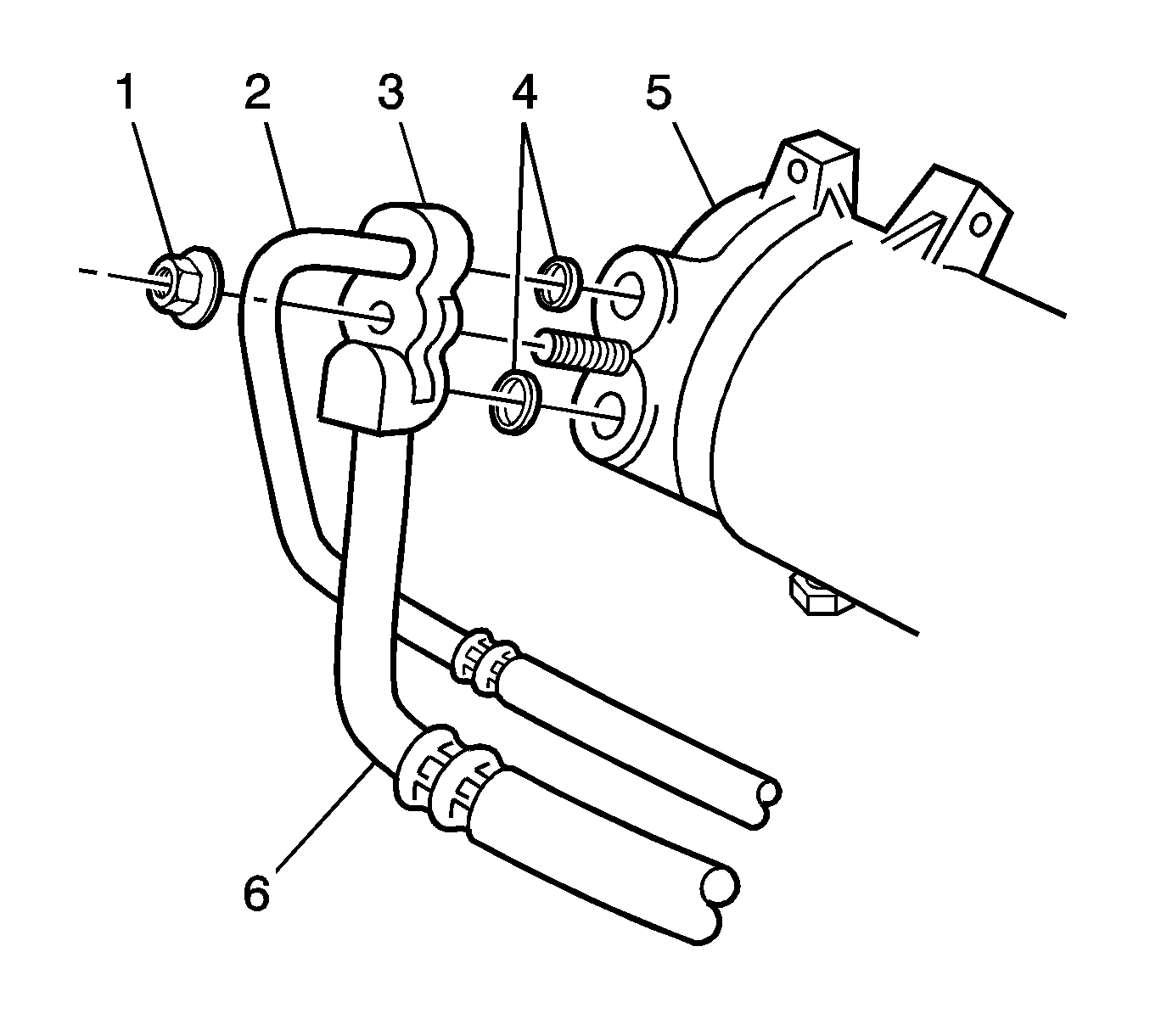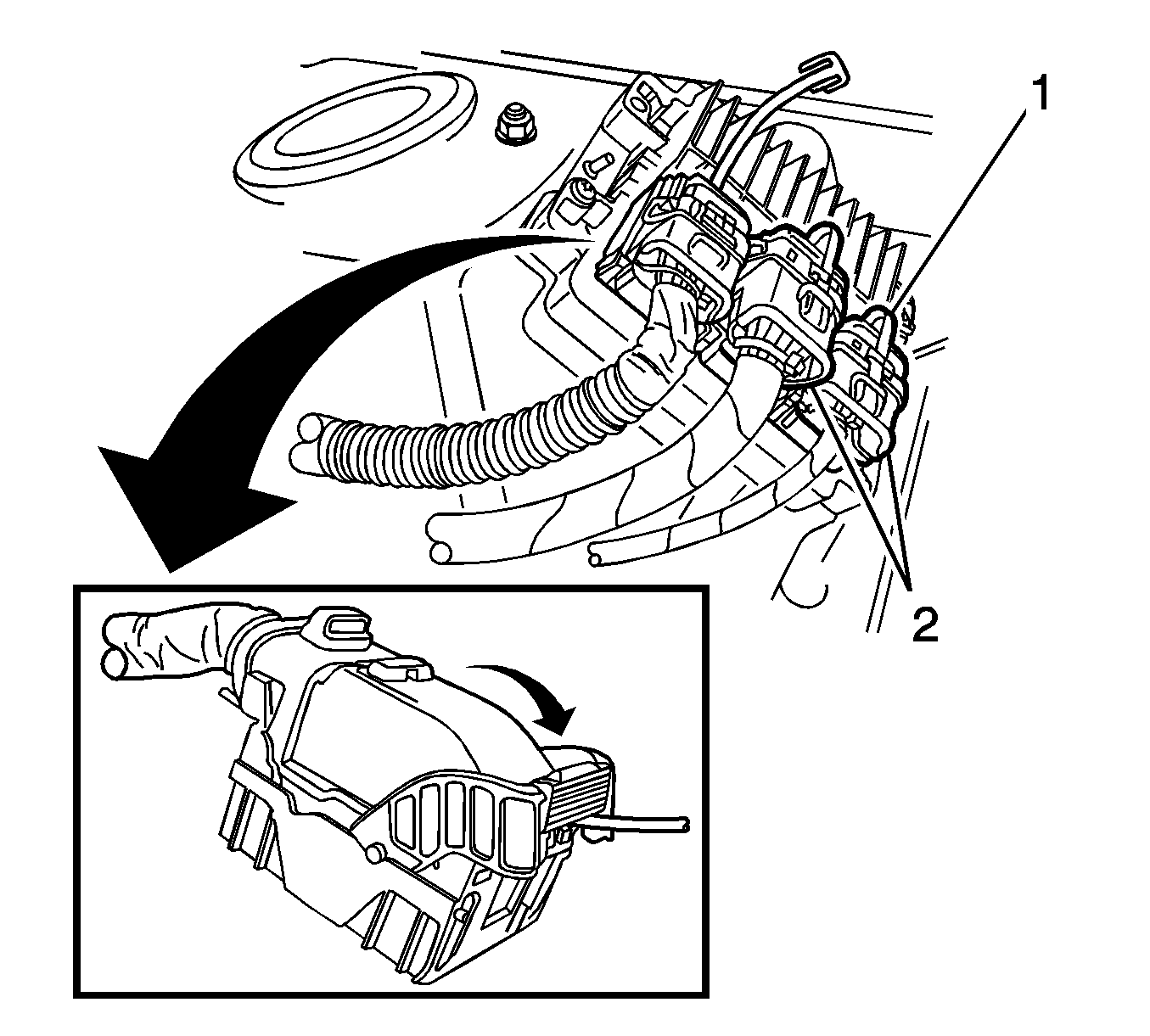Tools Required
J 41798 Engine Lifting Brackets
Removal Procedure
- Disconnect the negative battery cable.
- Recover the air conditioning (A/C) refrigerant. Refer to Refrigerant Recovery and Recharging in Heating, Ventilation and Air Conditioning.
- Remove the hood. Refer to Hood Replacement in Body Front End.
- Remove the front suspension support brace. Refer to Front Suspension Support Brace Replacement .
- Remove the fuel rail covers.
- Remove the intake duct from the vehicle. Refer to Air Cleaner Assembly Replacement .
- Depressurize the fuel system . Refer to Fuel Pressure Relief in Engine Controls.
- Remove the radiator. Refer to Radiator Replacement in Engine Cooling.
- Remove the radiator hoses from the water pump.
- Remove the heater hoses from the water pump.
- Remove the A/C compressor and condenser hose nut (1) at the compressor.
- Separate the A/C compressor and condenser hose (6) from the A/C compressor (5).
- Remove the ground lead screw from the engine block and left had engine mount.
- Disconnect the positive lead terminal from the battery. Lay the harness on the engine.
- Disconnect the A/C wiring harness connector
- Remove the fuel rail feed line. Refer to Fuel Hose/Pipes Replacement - Engine Compartment
- Remove the evaporative emission (EVAP) lines. Refer to Evaporative Emission Hoses/Pipes Replacement - Engine .
- Loosen the hose clamp on the return hose at the power steering reservoir.
- Place a suitable container under the reservoir and remove the hose and drain the reservoir fluid.
- Remove the high pressure line flare nut and O-ring from the pump outlet fitting at the rear of the power steering pump.
- Remove 2 engine control module (ECM) electrical connector locks (1).
- Disconnect 2 electrical ECM electrical connectors (2).
- Feed the ECM harness under the brake and clutch master cylinder, if equipped.
- Remove the harness to dash panel clips, then lay the harness on top of the engine.
- Disconnect the brake booster vacuum hose and heater control, vacuum hose at the rear of the intake manifold.
- Remove the ignition coil and module for cylinder No. 7. Refer to Ignition Coil Replacement
- Remove the right and left engine mount to engine bracket nuts.
- If equipped with manual transmission, remove the bolt attaching the clutch master cylinder reservoir bracket to the end of the master cylinder.
- Remove both exhaust manifolds. Refer to Exhaust Manifold Replacement - Left Side and Exhaust Manifold Replacement - Right Side in Engine Exhaust.
- Remove the 4 bolts securing the undertray to the crossmember.
- Remove the tray from the crossmember.
- Remove the 2 bolts securing the power steering high pressure line brackets to the oil pan.
- Remove the transmission. Refer to Transmission Replacement in Manual Transmission - Tremec 6-Speed and Transmission Replacement in Automatic Transmission - 4L60-E/4L65-E.
- Attach a suitable lifting chain and hooks to the 2 J-41798, engine lifting brackets.
- Using a suitable lifting crane, slightly raise the engine to clear the engine mount stud.
- Slowly lift the engine out of the engine bay.
Important: Cap the hoses and inlets when separating the cooling system components, this prevents dirt and other contaminants from entering the cooling system.


Installation Procedure
- Prepare the engine for installation. Refer to Engine Prelubing .
- Install the J 41798 to the engine.
- Using an engine hoist and the J 41798 raise the engine slightly.
- Remove the engine from the engine stand.
- Using an engine hoist and the J 41798 lower the engine onto the crossmember.
- Slowly lift the engine into the engine bay.
- Install the transmission. Refer to Transmission Replacement in Manual Transmission - Tremec 6-Speed and Transmission Replacement in Automatic Transmission - 4L60-E/4L65-E.
- Install the 2 bolts securing the power steering high pressure line brackets to the oil pan.
- Install the undertray to the crossmember.
- Install the 4 bolts securing the undertray to the crossmember.
- Install both exhaust manifolds. Refer to Exhaust Manifold Replacement - Left Side and Exhaust Manifold Replacement - Right Side in Engine Exhaust.
- If equipped with manual transmission, Install the bolt attaching the clutch master cylinder reservoir bracket to the end of the master cylinder.
- Install the right and left engine mount to engine bracket nuts.
- Install the ignition coil and module for cylinder No. 7. Refer to Ignition Coil Replacement .
- Connect the brake booster vacuum hose and heater control, vacuum hose at the rear of the intake manifold.
- Install the harness to dash panel clips.
- Feed the ECM harness under the brake and clutch master cylinder, if equipped.
- Connect 2 electrical ECM electrical connectors.
- Install 2 ECM electrical connector locks.
- Install the high pressure line flare nut and O-ring from the pump outlet fitting at the rear of the power steering pump.
- Position the power steering return hose to the power steering reservoir then tighten the hose clamp on the return hose.
- Install the EVAP lines. Refer to Evaporative Emission Hoses/Pipes Replacement - Engine .
- Install the fuel rail feed line. Refer to Fuel Hose/Pipes Replacement - Engine Compartment .
- Connect the A/C wiring harness connector
- Connect the positive lead terminal to the battery.
- Install the ground lead screw to the engine block and left had engine mount.
- Install new O-rings (4) onto the A/C compressor hose block fitting (3). Refer to O-Ring Replacement in Heating, Ventilation and Air Conditioning.
- Install the A/C compressor and condenser hose to the A/C compressor (6). Secure with the nut (1).
- Install the heater hoses to the water pump.
- Install the radiator hoses to the water pump.
- Install the radiator. Refer to Radiator Replacement in Engine Cooling.
- Install the intake duct from the vehicle. Refer to Air Cleaner Assembly Replacement .
- Install the fuel rail covers.
- Install the front suspension support brace. Refer to Front Suspension Support Brace Replacement in Front Suspension.
- Install the hood. Refer to Hood Replacement in Body Front End.
- Refill the air conditioning (A/C) refrigerant. Refer to Refrigerant Recovery and Recharging in Heating, Ventilation and Air Conditioning.
- Fill the crankcase with the proper quantity and grade of engine oil. Refer to Approximate Fluid Capacities and Fluid and Lubricant Recommendations in Maintenance and Lubrication.
- Connect the negative battery cable.
- Disable the ignition system.
- Crank the engine several times. Listen for any unusual noises or evidence that parts are binding.
- Enable the ignition system.
- Start the engine and listen for unusual noises.
- Check the vehicle oil pressure gage and confirm that the engine has acceptable oil pressure.
- Run the engine speed at about 1,000 RPM until the engine has reached normal operating temperature.
- Listen for sticking lifters and other unusual noises.
- Inspect for fuel, oil, and/or other coolant leaks while the engine is running.
Notice: Use the correct fastener in the correct location. Replacement fasteners must be the correct part number for that application. Fasteners requiring replacement or fasteners requiring the use of thread locking compound or sealant are identified in the service procedure. Do not use paints, lubricants, or corrosion inhibitors on fasteners or fastener joint surfaces unless specified. These coatings affect fastener torque and joint clamping force and may damage the fastener. Use the correct tightening sequence and specifications when installing fasteners in order to avoid damage to parts and systems.
Tighten
Tighten the bolts to 25 N·m (18 lb ft).
Tighten
Tighten the bolts to 30 N·m (22 lb ft).
Tighten
Tighten the bolt to 10 N·m (7 lb ft).
Tighten
Tighten the nuts to 80 N·m (59 lb ft).


Tighten
Tighten the nut to 30 N·m (22 lb ft).
If necessary, install an oil pressure gage and measure the engine oil pressure.
